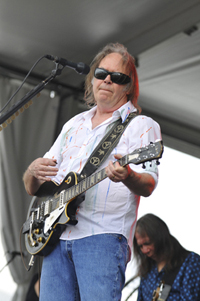
Neil Percival Young, born 12th November 1945, Toronto, Canada.
Neil Young is best known for his distinctive guitar riffs, deeply personal lyrics and signature falsetto singing voice.
The Canadian singer-song writer initially made his name as part of Buffalo Springfield in 1967. The band produced 3-albums, but was ultimately short lived splitting in 1968. Later that year Young released his first solo album, Neil Young. The album received mixed reviews.
Interestingly the album was initially released using the Haeco-CSG encoding system, a technology designed to make stereo records compatible with mono record players. Young was unhappy with the sound quality and the album was remixed and re-released in 1969 without Haeco-CSG processing.
For his next album Young recruited three musicians and formed Crazy Horse. In 1969 they released “Everybody Knows This Is Nowhere”, credited to Neil Young with Crazy Horse.
In 1969 Young reunited with Stephen Stills from Buffalo Springfield and joined Crosby, Stills & Nash as a fourth member. During the making of their first album, Déjà Vu, the musicians frequently argued, particularly Young and Stills, who both fought for control. However Young’s tenure in Crosby, Stills, Nash & Young coincided with the bands most creative and successful period.
In 1971, with CSN&Y splitting up and Crazy Horse having signed their own recording deal, Young released his fourth solo album, Harvest. The album was a massive hit. The album included “Heart of Gold”, which remains his only No.1 hit in his long career. Other tracks included a rework of Young’s, “Southern Man”, in which Young condemns racism and which inspired Lynyrd Skynyrd’s “Sweet Home Alabama”. The album also included “The Needle and the Damage Done”, which describes the descent into heroin addiction of musicians he knew, in particular Crazy Horse member Danny Whitten, who eventually died of an overdose.
A pioneering musician, Young not only experimented widely with his musical style, but also recording methods. During the recording of Harvest, Young laid down sections of the album, including “Heart of Gold” at Quadrofonic Sound Studios with produced Elliot Mazer. The electric based songs were recorded in a barn at Young’s ranch. Using a remote recording system, Mazer setup PA speakers in the barn for monitor rather than have the players wear headphones. The resulting leakage into each microphone can be heard in “Are You Ready for the Country”, “Alabama” and “Words”.
The success of Harvest caught Young off guard, and his first instinct was to back away from stardom. In the handwritten liner notes to the Decade compilation, Young famously described “Heart of Gold” as the song that “put me in the middle of the road. Traveling there soon became a bore, so I headed for the ditch. A rougher ride but I saw more interesting people there.”
Young re-emerged and went on to record a collective of 3-albums collectively called “The Ditch Trilogy”. A brooding and powerful collection of music, recorded whilst Young struggled to deal with deaths of Danny Whitten and one of his roadies from heroine overdoses.
Throughout the 80s and 90s, Young continued to record and perform. With mixed success and many musical experimentation’s. His recording career now spans over 40-years and includes 34-albums. In 2010 he remains a prominent artist.

